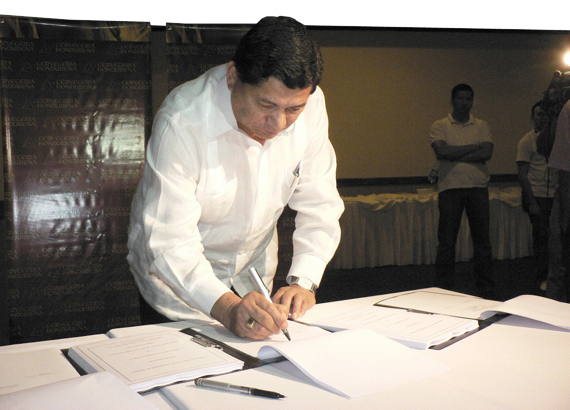|
With Felicito Ávila, Minister of
Labour
STIBYS
- SABMiller / Coca Cola Agreement:
A role model to follow In addition, Minister
intervenes in the industrial dispute at the National Agrarian Institute (INA)
|
The signing of the new
collective agreement between the Union of Beverage and Related Industry Workers
(STIBYS) and Cervecería Hondureña SA (SABMiller - Coca Cola) represents an
important outcome for the future of industrial relations in Honduras. This is
what the Minister of Labour has told Sirel after the ceremony in San Pedro Sula,
ensuring at the same time that he is committed to searching for a solution to
the serious industrial conflict in the INA.
-After nearly 14
months, a new agreement between the STIBYS and SABMiller / Coca Cola has been
signed. How do
you evaluate this outcome?
-It is a great
satisfaction, because it is a step forward that improves working relationships
and productive ones in the country.
Hopefully this will be
a stimulus so that in every company there are unions and collective bargaining.
-That has not been
achieved yet…
-It is a process. In a
society like ours we must start with the fact that we have to educate ourselves,
so as to know that compliance with the law is what gives us the exercise of
freedom.
If we achieve this goal
we will have more freedom to be more democratic, and have better working
conditions and living standards.
-In his speech, Carlos
Reyes, president of STIBYS, has demanded once again the abolition of the law
that promotes temporary employment. What is your opinion
on this?
-It is an issue
that we are also discussing with the trade unions and we will meet to discuss
and learn about their approach. We have to find mechanisms to promote job
stability.
- Do you share the
concept that all permanent work must be done by permanent workers?
-In order to
have decent jobs we have to have permanent work.
When that does not
happen we have difficulties because the workers’ rights can not be guaranteed.
We all aspire to the
existence of permanent jobs, however it can not be ignored that the same crisis
of the Government has made us look for alternatives.
Now it is important to
enter a dialogue stage, to see if we have got through that moment, and if we can
encourage permanent work once again.
-The dispute and the
crisis at the INA continue.
How is the
Ministry doing the follow up?
-After the Union of the
National Agrarian Institute Workers (SITRAINA) called for the closure of
the mediation stage, I contacted their directors and the director of INA,
César Ham. I can tell you that we will resume the mediation stage.
Also, I spoke with
Carlos H. Reyes, on behalf of the UITA, with Juan Barahona of
the Unitary Federation of Workers of Honduras (FUTH) and Luis Santos
Madrid, president of SITRAINA.
We all agree on the
need to get the parties together again to seek a solution to the conflict.
-Would
you be available to talk directly with the parties to try to close the gap
before resuming Mediation?
-The break is
deep, but I have talked to the director of INA and told him to act in the
same way we are doing with the rest of the mediations.
It is necessary
that empowered people attend the negotiation meetings and not just any delegate.
He agreed and we will meet without wasting any more time.
 |